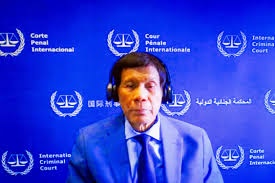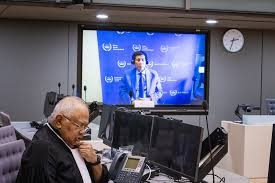Introduction: The Weight of the World Court’s Decision

In a legally significant and highly anticipated development, the Pre-Trial Chamber of the International Criminal Court (ICC) has decisively affirmed its jurisdiction over the case concerning former Philippine President Rodrigo Duterte and his administration’s controversial “War on Drugs.” The ruling, formalized in a comprehensive 32-page decision dated October 23, rejects the fundamental jurisdictional challenge mounted by the Duterte legal team, marking a crucial step forward that could eventually lead to a full-blown trial for crimes against humanity.
The decision, handed down by Judges Iulia Antoanella Motoc, Reine Adélaïde Sophie Alapini-Gansou, and María del Socorro Flores Liera, focuses on the continuity of the ICC’s engagement with the Philippines, circumventing arguments related to the country’s formal withdrawal from the Rome Statute. This pivotal judgment ensures that the pursuit of justice for the estimated 12,000 to 30,000 deaths linked to the anti-drug campaign remains squarely within the purview of the global tribunal.
The Heart of the Legal Battle: Jurisdiction and Withdrawal
The core of the Duterte camp’s appeal lay in a novel, time-bound legal argument centered on the Philippines’ withdrawal from the Rome Statute, the treaty that established the ICC. The Philippines’ withdrawal officially took effect in March 2019.
The defense team asserted that the ICC lacked jurisdiction because the formal investigation by then-ICC Prosecutor Karim Khan had only commenced in September 2021—a date falling well after the two-year period following the country’s effective withdrawal. Their premise was that the court’s authority over a member state ceases entirely once withdrawal is finalized, especially if key investigative steps only begin afterward.
This attempt to time-bar the investigation was a strategic legal maneuver aimed at extinguishing the case. However, the ICC Pre-Trial Chamber effectively dismantled this argument by focusing on the legal status of the case prior to the official withdrawal date.
The ICC’s Counter-Argument: Continuity of Consideration
The judges’ ruling hinges on the concept of continuity and the legal definition of the “matter” under the Court’s consideration. The Chamber emphasized that the case was already under the Court’s jurisdiction before the Philippines’ formal exit from the Rome Statute became fully effective.
The defense tried to separate the initial steps—specifically, the preliminary examination initiated by former ICC Prosecutor Fatou Bensouda—from the subsequent decision to authorize an investigation. The Duterte camp argued these were distinct “matters,” implying that the preliminary examination closed when the withdrawal took effect, thus requiring a new basis for the full investigation.
The ICC judges categorically rejected this compartmentalization. They ruled that the “matter” remains constant throughout the process:
“The matter that was already under consideration by the Court was the allegations of crimes committed in the Philippines. That matter was under consideration in the preliminary examination and remained under consideration when the Prosecution requested, and the Chamber granted, authorisation for the commencement of the investigation in the Philippines Situation. It remains under consideration in the present case.”
By linking the preliminary examination (which began while the Philippines was a member state) directly to the subsequent investigation, the Court established a contiguous legal framework. The implication is clear: jurisdiction, once legitimately established over crimes committed while a state was a member, is not nullified by a subsequent withdrawal for the purpose of investigating those specific crimes. This judicial interpretation safeguards the Court’s ability to act on crimes committed during a period of membership, regardless of the state’s later political decisions.
Broader Implications: Justice for Victims and the Principle of Non-Impunity

The significance of the Pre-Trial Chamber’s decision extends far beyond the legal technicalities of the Rome Statute.
1. Validation for Victims: The ruling represents a major validation for the victims and their families, whose stories have been central to the proceedings. The decision ensures that their calls for accountability—which continued to reach the ICC even amidst political efforts to halt the probe—are being heard at the international level. For many, the ICC represents the last viable avenue for justice, given the lack of significant and successful local prosecutions of alleged perpetrators.
2. Upholding ICC Authority: The Chamber’s defense of its jurisdictional timeline strengthens the ICC’s authority worldwide. Had the Duterte camp’s argument prevailed, it could have created a dangerous precedent, potentially allowing other member states facing scrutiny to effectively evade investigation by simply withdrawing from the Statute before a formal probe could begin. The ruling underscores the principle that withdrawal is not a shield against accountability for past crimes.
3. Next Phase of Proceedings: The decision opens the door for the ICC Office of the Prosecutor to fully resume its investigation. This means investigators can now gather evidence, interview witnesses, and build a case potentially strong enough to issue warrants of arrest and move the process toward trial. This phase will likely focus on identifying those most responsible for the alleged extrajudicial killings.
Political and Domestic Ramifications
The ICC’s latest ruling will undoubtedly send tremors through the Philippine political landscape.
In the Philippines, the government’s stance on the ICC probe has been mixed. While the current administration under President Marcos Jr. has affirmed the country’s independent judicial system, it has also faced pressure from human rights groups and a significant portion of the public to cooperate with the ICC. The Duterte camp, meanwhile, has consistently maintained that the ICC is an infringement on Philippine sovereignty.
The ruling is a clear statement that, despite domestic politics, the international legal process will proceed. It forces the current Philippine government to reassess its position and potential obligations under international law, particularly regarding cooperation with the court, even though the country is no longer a member of the Statute. The question of whether the Philippine government will aid or obstruct the ICC’s investigative efforts will be a major test of its commitment to international justice.
Conclusion: A Path to Trial Remains Open
The Pre-Trial Chamber’s October 23 decision is a defining legal victory for the prosecution and for the victims of the “War on Drugs.” By soundly rejecting the withdrawal-based jurisdictional challenge, the ICC has cleared the largest legal hurdle preventing the case from advancing.
This ruling underscores the principle of non-impunity for crimes against humanity. It confirms that the ICC can, and will, pursue justice for alleged atrocities committed on the territory of a state during the time it was bound by the Rome Statute.
While the path to a full-blown trial remains long and complex—involving further evidence gathering, potential appeals, and the challenge of executing warrants in a non-member state—the Pre-Trial Chamber’s decisive judgment ensures that the pursuit of accountability for the thousands of lives lost in the Philippines remains a live and active case on the global stage.





